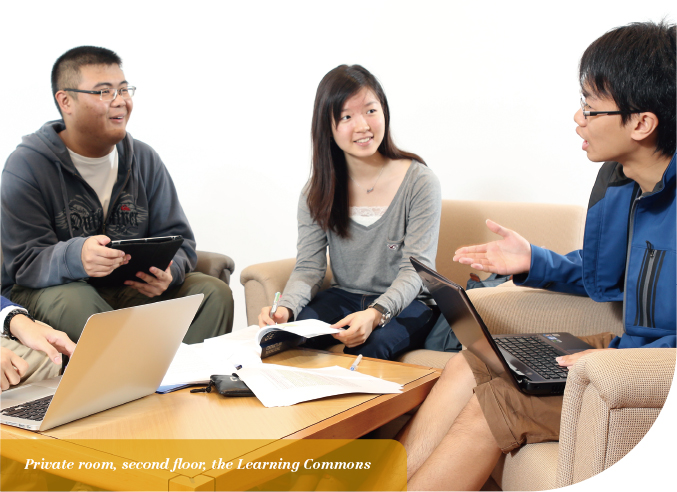

|
|||
"We're doing an assignment on the legal system and we were able to book a private room for our study group. Without this room, we would have nowhere to meet – maybe just the canteen."
- Cheung Po-yiu (pictured centre), Bachelor of Laws Year 1
|
|||
International Opportunities Language learning has also been strengthened in the new curriculum so that all students are required to earn compulsory credits in English and Chinese. The ability to communicate across cultures is a key aim of our reform and we provide opportunities for international exposure through exchanges, internships, faculty-level programmes, and a large non-local student presence on campus. In fact, in 2012 we had the largest non-local intake ever, with 654 new full-time undergraduates coming from Mainland China and 450 from elsewhere in the world. Our curriculum reform could be likened to the concept of 'think globally and act locally'. While we have introduced institution-wide reforms, it is their adoption at the faculty level that offers a true measure of how extensively they are being incorporated into student learning. Experiential learning, for example, has been approached in a variety of ways. The Faculty of Architecture has involved students in community building projects in Hong Kong and the Mainland through its Community Project Workshop. The Faculty of Engineering has a very active programme that brings its students into China to build schools and establish electronic learning networks. The Faculty of Arts has sought out internships for students in areas related to their majors, such as the cultural sector, book publishers and Japanese businesses. And the Faculty of Education will launch a new experiential learning programme for Liberal Studies students from 2013 in Lanzhou, Gansu, where students will gain exposure to authentic issues in their subject, such as cultural diversity, rural-urban disparity, energy resources, and changing conceptions of women's rights and the family. These are a very small sample of the kinds of experiential learning students can expect to participate in. Faculties have also been taking a more holistic approach by implementing changes to their learning programmes. The Faculty of Medicine, for example, has introduced a mandatory Medical Humanities programme to prompt students to think more deeply about the human side of treating patients. The Faculty of Engineering has a new BEng in Engineering Science that provides multi-disciplinary training in engineering and non-technical fields so students can develop a broader range of skills. The Faculty of Dentistry, an early adopter of problem-based learning, requires second-year students to participate in international online peer reviews so they can share experiences and benchmark themselves at the global level. The Faculty of Social Sciences has a social innovation and global citizenship programme that requires all undergraduates to participate in community projects and gain experience outside Hong Kong before they graduate. These initiatives have all been implemented within the past three years. An example of the evolution of the curriculum over time can be seen in the Faculty of Science. The Faculty introduced a common admission programme in 2007 in anticipation of the four-year curriculum. The goal was to break down the segregation that previously existed so, for instance, chemistry students would be exposed to other scientific disciplines. In 2008 an experiential learning requirement was introduced as well as a student advisory system. In September 2012 the Faculty introduced two compulsory foundation courses, one on quantitative reasoning and the other on integrated science, that provide students with a broad overview of modern science before they start to specialise. This mirrors the path that the University as a whole has embarked upon to ground students with the big picture before they turn to the hard specifics of their speciality. The new curriculum also provides students with options for double majors and major and minor combinations which, when combined with the Common Core and faculty-level programmes, can be both exciting and overwhelming. To help students navigate through the choices, an Academic Advising system was introduced in 2011. It pairs students with an academic in their faculty who can explain the options and help them stay on track. The aim is for students to take the lead as they determine the best paths for reaching their academic goals. |
|||